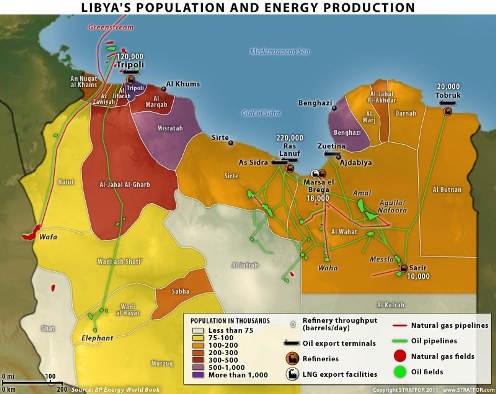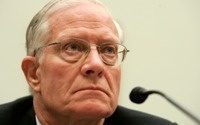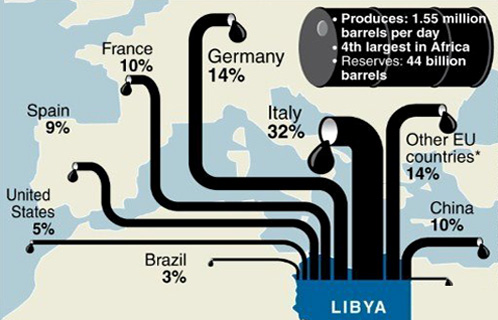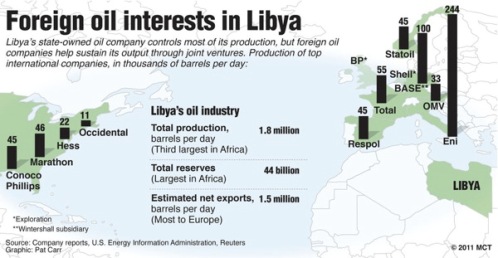By T. J. Coles. Axis of Logic Exclusive
Axis of Logic
Sunday, May 6, 2012
Editor's Comment: The following report is the 4th and final report in the series, "Libya One Year After" by Axis of Logic Columnist, T.J. Coles. We thank him for establishing a fully documented and accurate history of NATO's destruction of Libya 2011. Read Parts I, II and III of this important series that exposes the deceptive foundation provided by the invader for their war on the people of Libya. If you haven't already done so, read T.J. Cole's first three reports in this important series:
- One Year On. Why we attacked Libya
- Libya: One Year On (Part 2): Recording NATO's War Crimes
- Libya One Year On (Part 3): The Propaganda and the Law
The victor no longer has the luxury of writing their own "history" of their war crimes. Coles shows that NATO's destruction of Libya was nothing more nor less than the crimes of first degree murder and armed robbery on a grand scale.
- Les Blough, Editor
 |
In the mid 1990s, the British secret services sought to depose Muammar Gaddafi by working with their mujahideen terrorist allies, the Libyan Islamic Fighting Group (LIFG), whose members they had trained in Afghanistan in the 1980s.1
defeated the LIFG, jailing its leaders and launching attacks against LIFG bases. Gaddafi, fearing a coup, sought rapprochement with Britain. In 2000, Oil Diplomacy quoted Gaddafi as saying: “Libya wants to encourage foreign capital investment and partnership, not only for the benefit of this country but for the entire African continent to which Libya is the gateway for Europe.”2
At that point, MI6 betrayed the LIFG and began working closely with Gaddafi’s regime.3
MI6 and the CIA even helped Gaddafi to capture LIFG leader Abdel Hakim Belhadj, who “said that he was tortured by CIA agents before being transferred to Libya.”4
History repeats. In the twelfth century, the Order of the Knights Templar received contract to plunder what is now Libya. By the early thirteenth century, the Templar had accumulated too much personal wealth and influence. Consequently, the Pope, Philip IV and Edward II had many of the Knights Templar arrested and tortured.5 In the world of power and greed, friends and allies change and disappear as quickly as the wind.
More Blood for Oil
From 2004 to around 2009, numerous business-linked politicians courted Gaddafi publicly. They included Tony Blair, working on behalf of Shell, BP, and JP Morgan;6 then-Foreign Secretary and European Council on Foreign Relations member David Miliband; and Neil Kinnock MP. The latter “discussed Shell’s business in the region and helped promote the UK’s wider energy agenda,” the Guardian reported, adding that “British oil interests got its second major boost in Libya … when BP won rights for exploration and development work there.”7
 |
| Tony Blair courting Col. Qaddafi in Tripoli for oil and gas in 2007 |
In 2007, BP’s chief executive Tony Haywood bragged of Libya’s potentially “large resources of gas, favourable geographic location and improving investment climate. … It is BP’s single biggest exploration commitment.”8
The website also noted that “BP will spend $50 million on education and training projects for Libyan professionals during the exploration and appraisal period, and, upon success, a further $50 million from commencement of production.”9
 |
| Pro-war Anthony Cordesman on Libya in 2011 |
According to the pro-war Anthony Cordesman, energy companies at work in Libya after Blair’s deal also included Eni, Total, Repsol YPF, StatoilHydro, Occidental, OMV, ConocoPhillips, Hess, Marathon, ExxonMobil “and others,”10 including the BG Group. A European Council on Foreign Relations report explained that Europe’s economic relationship with Libya has … made it more difficult for some leaders to extricate themselves from relationships with Gaddafi’s regime.
Libya exports natural gas to Italy via the 520 km Greenstream underwater pipeline, and to Spain in the form of LNG [liquefied natural gas]. … Austria receives 21.2% of its crude oil imports from Libya, France 15.7%, Germany 7%, Greece 14.6%, Ireland 23.3%, Italy 22.0%, Netherlands 2.3%, Portugal 11.1%, Spain 12.1%, United Kingdom 8.5%.11
NATO stated that “65 per cent of the oil and natural gas consumed in Western Europe passes through the Mediterranean each year, with major pipelines connecting Libya to Italy and Morocco to Spain.” NATO’s statement concluded that “Since October 2001 NATO ships have been patrolling in the Eastern Mediterranean.”12
| David Miliband in March, 2011 complaining that Qadaffi's son, Saif was permitted to give a talk at London School of Economics in May, 2010 |
In 2009, David Miliband stated that “With the largest proven oil reserves in Africa and extensive gas reserves, Libya is potentially a major energy source for the future,” adding that “We work hard to support British business in Libya, as we do worldwide.”13
Around that time, the Labour government commissioned Malcolm Wicks MP to research an extensive energy review, later approved by Miliband’s brother, Ed (the Energy Secretary at the time). Wicks observed that “The UK already imports LNG [liquefied natural gas] from both Algeria and Egypt in North Africa, where Libya also has great potential.”14
Libya and the BMENAI
More than just the energy issue, however, is Libya’s role in the Broader Middle East and North Africa Initiative. After the collapse of the rival Soviet Union in 1991, Europe began an economic liberalisation scheme for North Africa titled the Mediterranean Neighbourhood Policy.15
The goals were to end the region’s unemployment and to close the “gateway” to Europe for Sub-Saharan African refugees. Both reasons had to do with preventing immigration to Europe.16 Around the same time, the US concocted a similar scheme involving broader economic liberalisation (the Greater Middle East project).17
 |
The west salivates over Libya's oil and gas. |
In 2004, once the all-important oilfields of Iraq had been secured, the Euro-American plans merged at the G8, and were renamed the Broader Middle East and North Africa Initiative (BMENAI). In keeping with “democracy promotion”, the BMENAI had no input from the people of the region or their unelected dictators, most of whom expressed outrage.18
The objectives are to open Euro-American creditor banks, lower trade tariffs, and liberalise corporate law.19
In 2004, the Libyan-British Business Council was established, providing a forum for some one-hundred-fifty companies, including Shell, BP, Barclays, HSBC, and BAE Systems. Its aims are “to maintain a favourable business climate and minimise bilateral difficulties” in order to “overcome common barriers to market entry … [b]y acting as an influential and informed advocacy group on behalf of UK business in Libya.”20
 |
Foreign oil companies chafing at the bit to safely extract oil from Libyan oil fields. |
In 2010, following the G8’s Libya 2025 liberalisation scheme, the European Commission (EC) published a position paper on Libya’s economy. The EC’s “main external donors” include various UN agencies and “large oil companies … ENI, Petro-Canada, Exxon, Stat Oil Hydro …, a private university and NGOs.” Those organisations made suggestions on the EC’s paper. The follow-up concept note was “circulated to … various international financial institutions (in particular the World Bank).” Once it was approved by those paymasters, the final position paper read:
"hydrocarbon wealth has made Libya, on a per capita basis, one of richest countries in Africa. … [I]t is understood that the country has very limited external debts. … [A]ll citizens have free access to a generous package of health care … [However, t]he EC strategy has one overarching objective: to consolidate Libya’s integration in the rules-based international political and economic system."21
The “rules-based” system means compliance with Full Spectrum Dominance22 in the New World Order.23 The EC demanded:
"a deep and comprehensive free trade area (FTA) to cover trade in goods and services, investment issues and other key trade rules (intellectual property rights, competition, public procurement, trade and sustainable development, sanitary and phyto-sanitary rules, statistics, customs, and trade facilitation)[,] … as well as [discussing] many sectoral issues, in particular energy, transport, environment, industrial and enterprise policy, tourism and cultural heritage, agriculture and rural development, fisheries and an integrated approach to maritime affairs, including maritime governance, science and technology, education and training, etc. … Libya needs to adopt modern administrative and management techniques."24
In other words, the powers that be had planned for a full corporate takeover of Libya, and their well-funded propaganda machine tried to convince their Western domestic publics that NATO was acting as a guardian of human rights. ...
Libya One Year On (Part 4): Opened for Business: the corporate takeover